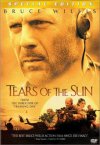BUY THE DVD:
|


|
|
|
SYNOPSIS:
| |
a special-ops commander leads his team into the jungles of nigeria to rescue a doctor who will only go with them if they agree to rescue 70 refugees as well.
|
|
|
MOVIE FACT:
| |
"tears of the sun" was originally the title of the long in development franchise sequel, "die hard 4," a film also starring bruce willis.
|
|
|
RATING:
|


two out of four possible stars
|
|
|
|
Director Antoine Fuqua proved he was capable of delivering a high octane action film with the violent police drama, Training Day and he tries his best to do that again with the war film, Tears of the Sun. Although the film slows down in some areas because of its reliance on melodramatic storytelling, the movie as a whole is still quite satisfying, given the performances of a talented cast. Although the realism doesn't approach the similarly themed Black Hawk Down in terms of bloody realism, that might only be because Fuqua relied more on a steadi-cam operator than did Ridley Scott, the director of Black Hawk.
Although Tears might not gain acclaim for bringing something unseen before to the screen, in its genre, it still is a film which is more entertaining, at best. At worst, the movie fails to combine the aspects of melodrama (character development) and action sequences (plot development), but because the filmmakers attempted to include both of these important elements, perhaps they should be given more than just an "A" for effort. It is often hard to bring in an audience from a wide demographic to a film that deals strictly with war, but Tears of the Sun is certainly gripping enough to entertain people who enjoy good action films.
Not all films that deal with war can be as complex as Schindler's List or as long (thankfully) as Gods and Generals. But giving the audience characters to empathize with and giving those characters insurmountable odds seems to be the common, yet well-taken course of Tears' group of filmmakers. Surely the locations shot on alone make this film one of the most visually interesting war films to come around in a long while. Far from the bombed city streets of World War II era Europe and centuries away from modern civilization, the jungle trek through Nigeria that Bruce Willis and his co-stars must take literally looks like something out of a flooded street in hell.
Far beyond the colorful "set dressing" though, the actors (and their make-up artists) also gave the good impression that they'd been trekking through the dirtiest, muddiest stretch of jungle in the world. Added to the powerful performances across the board from a well-chosen group of actors, and the result is more entertainment than historical. Where the filmmakers faltered though was in the editing process. Some shots carried on a few moments too long, and could have been cut down without sacrificing story or audience sympathy. A few times too often, one of the Special-Ops men would be emotionally wracked by something that had just occurred, and the editor allowed these types of shots to extend just a few beats too long.
Though the action sequences never seemed too long, ironically, the "thinking man's" portion of the film, i.e. the dialogue heavy scenes, slowed down the ticking clock always humming in the background. The task of getting a group of Nigerian refugees and an American doctor out of the way of hostile forces is made into a more dramatic flight given the constant presence of rebel troops on the soldiers' trail. Though the film itself is not long, some of the scenes when guns were not being fired and grenades were not being thrown tugged on the intensity of the picture, making the running time seem longer than it really was.
Something else which may weigh heavily on viewers' minds is the soundtrack. Though it is filled with the usually beautiful orchestrations of a man too often forgotten by the Academy Awards, Hans Zimmer's abilities carry quite a large stick in this film and scream as loud as any one of the explosions. While the score is well-orchestrated, one cannot help but think the volume is applied too forcefully at times. It's a shame when a score bombards the audience with louder than necessary tracks, but perhaps the sound editors should be taken aside and spoken with, rather than the composer. But as most "war" films have a loud, intense soundtrack, perhaps it is the fact that the score seems to intrude into the more private moments of the soldiers that makes it so noticeable.
But beyond the over-enthusiastic orchestral score and the lackadaisical editing, Tears of the Sun is still, overall, a good example of a war film with a greater ability to entertain than inspire. There are small lessons offered to the audience about being a "decent human being" and other basic moral dilemmas. And the tears shed by the thankful refugees at the end of the film should tug at the heartstrings of most engaged moviegoers. Though there are some hang-ups with the editing and pacing, the film is still an emotionally satisfying experience, even if it isn't the most intelligent.
With a strong leading performance by Willis and additional strength from co-star Monica Bellucci, Tears of the Sun benefits from expert direction from Fuqua and isn't mired completely in its faults. If anything, Tears of the Sun is a film that should appeal to a wide audience both because of its gripping drama and good basic storytelling. It's a "typical" war film in that it's one that is told on the front lines of war, but the regularity of the story is certainly lessened by the filmmakers to rein such an epic story into two hours.
Review by Kelsey Wyatt.
| |
|